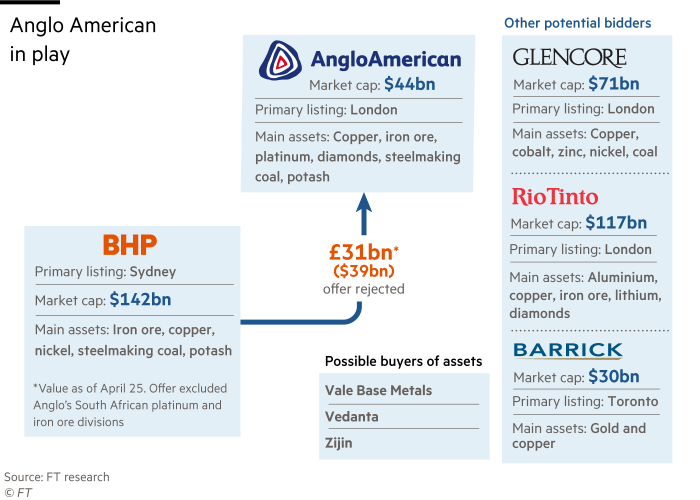BHP’s unsolicited £31bn takeover approach for Anglo American has shaken up the mining industry, provoking speculation that the storied company is ripe to be sold or broken up.
Anglo rejected the preliminary offer on Friday as “highly unattractive” but investors expect BHP to return with an improved deal or for a rival to emerge with a competing bid.
“I think there could be a lot of interloper risk,” said one large mining sector investor. “The details of Anglo are sitting on every CEOs desk, that I can assure you.”
Anglo, which is holding its annual shareholders meeting in London on Tuesday, is a sprawling business spanning coveted copper mines in Peru and Chile, complex iron ore and platinum operations in South Africa and the 136-year-old diamond company De Beers.
Rival miners with the firepower to mount a competitive offer include the Anglo-Australian mining company Rio Tinto and UK-listed Glencore. North American rivals such as Mark Bristow’s Barrick Gold are also likely to be weighing their options, while a bid for all or part of Anglo American from Brazil’s Vale, India’s Vedanta Resources or a Chinese player such as Zijin Mining could not be ruled out, analysts said.

Glencore: a better fit than BHP?
Glencore, alongside its London-listed rival Rio, is the most viable alternative bidder for Anglo, according to analysts and investors. Its chief executive, Gary Nagle, has likely been scrutinising Anglo’s business and BHP’s proposal since news of the approach broke last week.
The Swiss-headquartered trader-cum-miner is the most naturally acquisitive of the mining majors, having been built by former chief executive Ivan Glasenberg, who favoured buying existing assets over developing new mines. Glasenberg, who owns about 10 per cent of the company, remains its largest shareholder.
Many of Anglo’s mines would fit better in Glencore’s portfolio than with BHP, according to analysts and market insiders. Glencore and Anglo own 44 per cent each of the prized Collahuasi copper mine in Chile, meaning a takeover would give Glencore near full control.
Whereas BHP has asked Anglo to spin off South African Kumba Iron Ore prior to any takeover, Glencore would likely integrate it into its own operations in the country. The Swiss company has coal mines in South Africa and has long toyed with building an iron ore business. The company trades the metal but does not mine it. For the same reason, it would also be attracted to Anglo’s Brazilian iron ore project, Minas-Rio.
“It is a better fit than BHP,” said Ben Davis at investment bank Liberum, adding that Glencore “seem to have endless bandwidth for corporate strategy compared to other people.”
Glencore is already in the middle of a $9bn takeover of Teck Resources’ coal division.
The challenge for Glencore might be the size of the deal, Davis added. Glencore’s market value is greater than Anglo’s but half that of BHP. Glencore shareholders would therefore be left with only about 60 per cent of the combined entity, he said.
Rio Tinto: keen to diversify
Rio Tinto’s $118bn market capitalisation is also smaller than BHP’s, but the world’s second-biggest miner is big enough to mount an all-share offer for some or all of Anglo.
The UK-listed miner is heavily dependent on its highly profitable iron ore operations in western Australian and keen to diversify. It is still expanding the Oyu Tolgoi copper mine in Mongolia, but otherwise has limited options to increase its production of the metal, demand for which is expected to boom during the energy transition.
“At Rio, the need for diversification is that much more clear,” said Davis. Rio is developing the world’s biggest mining project in the Republic of Guinea but that mine will only provide more iron ore.
Unlike BHP, Rio also has operations in South Africa and an existing diamonds business, which could help it to manage Anglo’s diamond unit De Beers. Anglo and Rio also both have primary listings in the UK, which could ease any transaction. However, Rio would not want Anglo’s steelmaking coal assets, having exited the coal business in 2018.
Barrick Gold: copper in sight
Canadian-listed Barrick Gold may also be interested. The world’s second- biggest gold miner has sought to increase its access to copper under buccaneering South African boss Mark Bristow.
Bristow founded gold miner Randgold Resources in South Africa in 1995 and built it into a darling of the London Stock Exchange before merging with the larger Barrick in 2018.
Returning to South Africa and the LSE to buy Anglo American would be a big coup for Bristow, said John Meyer, a mining analyst at SP Angel. “It would be the pièce de résistance for Mark Bristow’s career.”
Other potential suitors
One person who knows Anglo better than most is its former chief Mark Cutifani, who was appointed chair of Vale’s independent base metals division in July 2023. The Brazilian iron ore miner spun out the copper and nickel-focused unit into a new structure last year, selling a 10 per cent stake to Saudi Arabia for almost $3bn.
At the time, Vale said the business would deploy up to $30bn on new projects over the next decade and might consider an initial public offering or a merger within three years.
With Cutifani at the helm and money to spend, it is better placed than most to target Anglo, or some of its mines, but lacks its own shares to do an all- stock deal.
A Chinese state-backed miner, such as Zijin Mining, or an Indian group such as Vedanta, might also seek to trump BHP’s bid or make a play for individual Anglo assets, said Meyer.
Vedanta founder Anil Agarwal was Anglo’s biggest shareholder between 2017 and 2019 through a complex structure that led to speculation he was planning a bid for the whole company.
China has huge demand for copper and iron, and controlling producing mines is a critical priority for Beijing.
“I think it’s reasonably likely that the Chinese will come in,” Meyer said. “The question is which Chinese state-owned company is best placed to do it?”
Rio, Glencore, Barrick and Vale declined to comment. Vedanta and Zijin have been contacted for comment.










